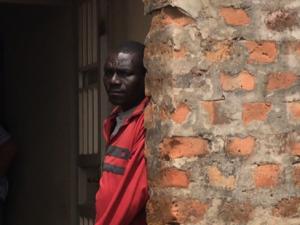
By David Hunter
At 14 years-of-age he was a schoolboy who had little intention of becoming a killer.
Denis Ojara cried for his mother when soldiers came to his village in 1996 and trailed him away from his home.
It didn’t take long for him to climb the ranks of Joseph Kony’s ‘Lord’s Resistance Army’ and earn a reputation as a ruthless soldier.
Denis, 36, was one of thousands of young boys taken from villages across Uganda to fight for the rebel group. He brutally murdered, stole, laughed and even danced through his teenage years in the Ugandan bush.
Within weeks of being ripped from his mother’s arms in Koch Goma, Ojara was taught how to use a gun, and was told what would be expected of him.
He did not disappoint.
LISTEN: David Hunter speaks to a former LRA 'Child soldier' forced to commit murder in Uganda
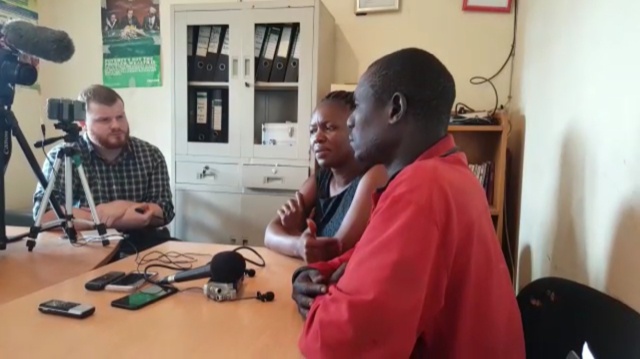
IMAGE: Q Radio's David Hunter speaks to former 'child soldier', Denis.
“There was lots of suffering in the bush.”
In a rare interview the farm worker told Q Radio how he killed a man after being called a ‘chicken thief’ and how he boiled a man’s body with the intention of eating him.
Denis had been desensitised by years of conflict and said the biggest issue he faced as an LRA soldier was hunger in the bush.
Speaking through a Translator he said: “Often, we just take the leaves from the trees and try to eat them to stay alive.” The soldiers went to trading centres and towns to raid and steal food. If they didn’t take part in the raids and abductions they would be threatened and killed.
Recalling the first time he murdered, Ojara told the story of a raid on a small village where an elderly man ‘insulted’ him by calling him a ‘chicken thief’. He believed it was 1997: “As soon as the old man saw us he started using very offensive language” he said. “He called us chicken thieves and we wanted the chicken. Later we had him killed.”
There was a strange calm on Denis’ face as he clasped his hands together to tell the stories of his past. It appeared he was haunted by his actions, but was holding on to a strong faith that he could be forgiven.
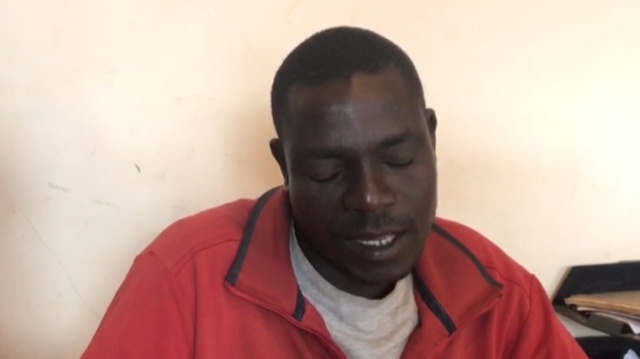
In another incident in Omot, he recalled the ‘nasty’ order from a senior commander to eat a council official. “We chopped him into pieces and put him in a big pot to be cooked.” It happened when reinforcements came (UPDF) to the camp and scared off the rebels. Denis said: ”It was a big pot with water. We cut up the pieces and put them in. Before we could eat - we were dispersed.”
Eventually he was chosen to serve directly under Joseph Kony, after a day of extreme bloodshed in Soroti. “When we came back we gave a report, and out of around 65 of us I’d done so well Kony himself said I should come and stay with him” said Denis. “He said I was courageous and had a strong heart like him. We were forced to do these things, but we would do whatever it would take to stay alive.”
Government forces and LRA members battled for power across Uganda since the 1980’s, when Kony began a campaign to build his Guerilla Army. People faced a decades-long conflict where children were regularly taken away from their homes. Particularly in the North of the country, murder, rape and massacres became an all too regular occurrence.
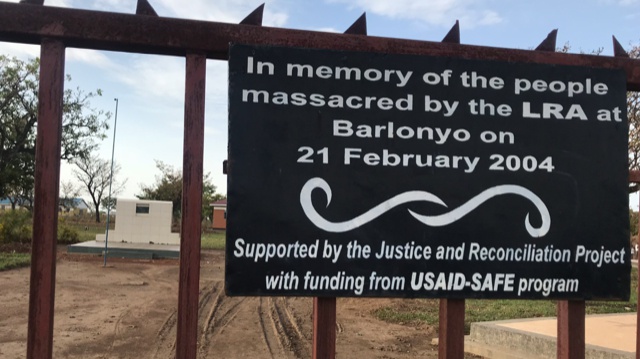
IMAGE: A monument marks a mass grave at the site of an LRA attack in Barlonyo which Denis was involved in
Q Radio had travelled to Uganda with Trocaire to see how the charity was spending money donated by members of the public on both sides of the Irish border. In a statement Trocaire says it’s work in Uganda will ‘support those affected by conflict, the development of sustainable livelihoods and gaining access to land.’ It also works with local partners there to improve women’s rights and attempt to hold the Government to account.
‘We danced and played in the bush’
Life as a child soldier is apparently still very much the life of a child.
When I asked if Denis had any fond memories from his time with the destructive group, he began to laugh and recall stories of celebrating Christmas and Ugandan Independence Day.
Children would steal radios from the villages and listen to music in the bush when there wasn’t much to do. Our translator told us the youths would often dance and have genuine happy moments together.
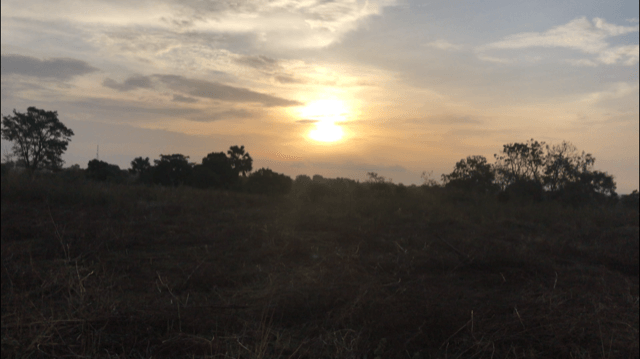
IMAGE: The rural bush in Uganda where Ojara served under the LRA
It was 2004 before a then 22-year-old could escape the grasps of the LRA. Soldiers lay sleeping around him in the bush – and those same radio’s he had danced to played in the back ground. Denis heard an advert calling on young men to come out of hiding and seek help. Agencies were working to provide shelter and security for former LRA soldiers, as anyone caught fleeing would have been killed.
Ojara left the camp with a gun before spending two years with World vision. In 2006 he went home to discover his mother had died, and many of his friends had been taken or killed. “It’s still not easy” he told Q Radio. “There is a lot of stigma because people know you were in the LRA - killing and taking other children. Now, I just want to live my life and try to make a living.”
Denis now works on a farm and is the proud father to a young boy, aged 10. He’s protected by an amnesty which states he’s not wanted for the crimes committed during his time with the LRA.
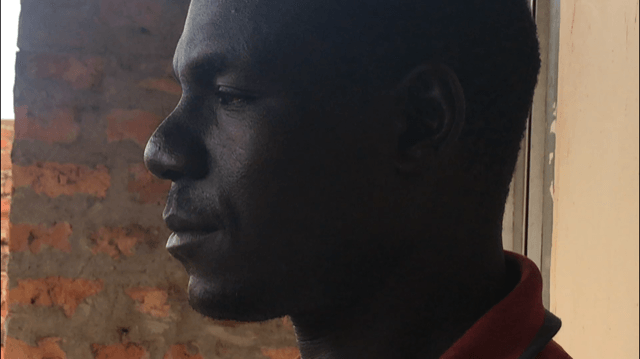
Joseph Kony remains at large and is believed to have travelled to neighbouring African countries where he continues to use the cover of the rural bush-land to hide.
War is also breaking out in the bordering countries of South Sudan and the Congo, where he is again suspected of recruiting child soldiers and encouraging conflict.
As a result of war over one million refugee’s have fled to Uganda in recent years. Trocaire’s work also supports them through education, healthcare and training initiatives.
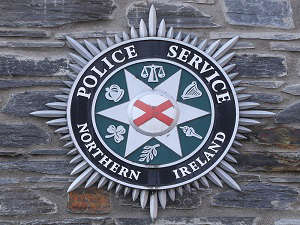 Teenage girl killed in road crash named as Kamile Vaicikonyte
Teenage girl killed in road crash named as Kamile Vaicikonyte
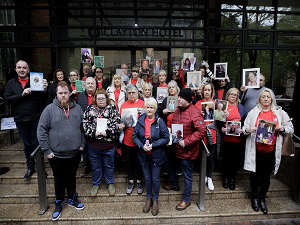 Covid-19 inquiry ‘an opportunity for candour’ from Stormont leaders
Covid-19 inquiry ‘an opportunity for candour’ from Stormont leaders
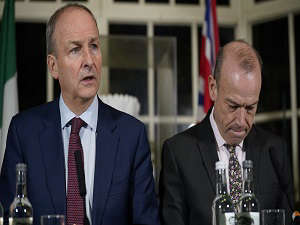 UK and Irish ministers to meet amid row over migration
UK and Irish ministers to meet amid row over migration
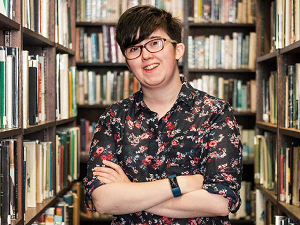 Three men set to go on trial for murder of journalist Lyra McKee
Three men set to go on trial for murder of journalist Lyra McKee
 Swann refuses to rule out resigning if budget is not changed
Swann refuses to rule out resigning if budget is not changed